#this analysis is from a western lens
Text
Okay but the way swords in danmei often represent/are associated with manhood and masculinity and the way hensheng is a soft sword and a sneaky weapob could very well represent JGY's position as "lesser" for his origins as a prostitute's son.
Like the way JGY is treated, in lack of better wording, as a woman, throughout the whole novel, (see: the way he's held up to higher standarts than everyone else, the way his standing will plummet with a single whiff of sex relating to him, the way he has to protect himself and take preemptive measures against everyone and everything and most of the time he's right)
I feel it kind of ties onto the way hensheng works, as an assassin's weapon, as something that doesn't require strenght per se, as something hidden easily, etc, and the fact that it's a soft sword— soft as women and JGY are expected to be, soft as they have to be to survive, but deathly nonethelesss
Idk. I'm just very into swords and very into the subtle themes of emasculation around JGY's character
#also fyi i have little to no knowledge of mandarin or chinese culture#this analysis is from a western lens#there's also the traditionally feminine role jgy has on the story#and the way he's hated in fandom#which really feels like hated female villain treatment that imo stems a lot from mysoginy#jin guangyao#jin guangyao meta#feral little meowyao#hensheng#sword symbolism#also ramble ramble#but the way jgy kill jgs really feels like a textbook female rage#like anger that's been endured and repressed for years#boiling over in the most horrific and vengeful way#hmmm#meta#analysis#character analysis#/drags hands through face#someone put me down please
30 notes
·
View notes
Note
sorry I’ve seen people on fucking polar opposites of the ideological spectrum call themselves liberal - you mind if I ask what it means when you use it?
Liberalism is an ideology born from the "enlightenment" thinkers, during the birth and rise of capitalism. It is an ideology which markets itself as not an ideology (despite very much being one) and as universal. Hence is why you see "western world" as a short hand for "liberalism" and "democracy" as a shorthand for "liberal democracy". Its founding thinkers include figures like Hobbes, Mills, Locke, among others. Liberals believe in universal rights or freedoms such as the right to life and property, liberty and justice for all, etc. etc.. However a key aspect of liberalism is that its practice often requires making exceptions to these "universal" rules. Even its founding thinkers did so. Locke though indigenous peoples were "savages" unfit for democracy and that slaves were rightful property. Mills thought "barbarous races" were unfit to rule entirely and must be taught to rule. The key point to liberalism is thay the exceptions made to their "universal" rules are always determined by those in power, largely, white people like mills and locke, and the bourgeoisie.
Every ideology, works as so: certain facts are more prevalent than others which justify certain actions against/for it, most often, violence. For liberalism, an example of such is it placing property rights above all else and therefore, violence in preservation of private property is justified (e.g. increased policing of vandalism, theft, etc.). Alternatively, people who are not citizens of a liberal country do not get access to the "universal" rights they proclaim, which justifies putting migrants in cages extra-judicially.
The liberal analysis of the world is (a) immaterial, meaning its basis of analysis is based on "universal" values (life, justice, property, etc.) and abstract ideas (freedom, liberty, etc.) rather than tangible, material causes, conditions, and effects, and (b) analyzes society with individuals as the basic social unit. This has the effect of breaking down problems into too atomized of a model to effectively be useful to society as a whole. Marxism, on the other hand, analyzes the world based on material conditions with classes of people as the basic social unit.
The liberal ideology suposed that, because it believes in "universal" rights (as defined by white european thinkers and boirgeoisie), liberalism must be applied everywhere. This is the ideological justification for its actions to bring liberalism to other countries as a cover for imperialist infiltration and superexploitation of the global south.
Finally, there are many different flavors of liberals. Classical liberals, conservatives, whigs, tories, progressives, many populists, neocons, social democrats, neoliberals, and many more. So long as you: believe in "universal" rights which can and should be applied everywhere, uphold property rights as one such universal right in some capacity, analyze the world using immaterial and abstract analytical tools, and/or view society through the lens of individuals and their actions, you are a liberal.
593 notes
·
View notes
Note
this might make me sound ignorant but is the radfem part of term not about hating men? they hate trans people, they hate men and they view both as predatory, obviously men are not their primary targets but I feel like it would be incorrect to say that they don't hate men, especially since many of them believe in gender separatism (which is bs for numerous reasons). it's wrong to bring up men every time someone talks about the transmisogyny terfs spew bc that would be derailing the conversation but can men (trans/cis/whatever) not express how they've been hurt by terfs in their own posts or conversations? apologies if ive completely misinterpreted what you were saying I just want to understand the topic better
I’m not disputing that terfs hate men. However, I think it’s an error to highlight their hatred of men as ideologically significant. Sure they talk about hating men, but their political alliances reveal that dismantling patriarchy, or a desire to oppress men, is not a concern for them, given that they support the criminalisation of sex work, the state enforcement of sex as biologically determined, and are allied with the same right wing groups (such as the Heritage Foundation in the US) that want to criminalise abortion and reinstate “traditional” white western gender norms. If you view terf political goals through the lens of hating men, then their political efforts have overwhelmingly been a massive failure. Which I don’t think is very useful analysis!
A hatred of men is also not politically useful in general, because there is no money to be made or political battles to be won hating men. Hatred of men is not a systemic issue because men are not oppressed as a social group on the basis of their manhood. There is no political or financial infrastructure built on the foundation of hating men, nor is there infrastructure dedicated to maintaining a systemic hatred of men. Hating trans people, however, is extremely financially and politically lucrative, particularly hatred of trans women/transfems, because of how transphobia and misogyny intersect with and reinforce one another. There are ample political, financial, medical, and social institutions that operate on the maintenance of patriarchy, many of which terfs share a political platform with. So terf hatred of men is clearly not that big a deal given how willing they are to ally with right wing groups and fascists, who are the last people on earth to tolerate the oppression of men as a political goal.
This is why people (myself included) take umbrage with the continued insistence that terfs hate men as a central foundation of their beliefs. It’s not incorrect to say that they hate men, but hating men is not the problem with terfs. Hatred of men is not an inherently reactionary position anymore than hating cis people is. The problem is the way terfs conceptualise gender, and the political goals that flow from that conceptualisation, which affects all trans people but primarily affect trans women/transfems. The spectre they raise about bathrooms, about sports, is always the age-old transmisogynistic conspiracy of “a man in a dress” “invading women’s spaces” because the historical legacy of transmisogyny looms large in public consciousness, and reinforced by medical/psychiatric institutions in particular, in a way that hatred and fear of trans men does not (autogynephilia exists as a mental illness but autophallophilia does not, for example. Julia Serrano talks about this in Whipping Girl if you want to read more on the subject). Terfs don’t care about trans men in men’s sports, they don’t raise the counter-spectre of trans men being mass assaulted in bathrooms by cis men who discover that they’re “really women” - these are not rhetorical moves that are interesting or useful to them, because it does not position them as victims. Trans men are hurt by their transphobic rhetoric, suffer under transphobic laws that are passed, and face transphobic discrimination from people in their lives as a result of how mainstream transphobia is (and I am speaking from significant and traumatic personal experience on this front). We are not, however, the face of the transgender boogeyman, and we are not the primary target of terfs. We are targets because we are trans, not because we are men. To be dismissive of the claim that terfs hate men is not a dismissal of the pain and violence transmascs go through, because our oppression is not founded on our manhood.
So when you see terf political efforts and terf rhetoric, their obsessive focus on trans women as arch villains who need to be destroyed, and you come to the conclusion that a hatred of men is the animating force behind terf political activity - that is a transmisogynistic conclusion, both because you are framing their transmisogyny as something that is primarily informed by a hatred of men, and because “terfs hate men” is a non-sequitur in discussions about the political and social damage that their beliefs cause. If terfs hate men, they do so as a hobby, and I don’t really give a fuck about their hobbies
#asks#even old new york was once new amsterdam#transmisogyny tw#transphobia tw#book club#I haven’t read all of whipping girl btw just excerpts#I need to read it though lol. I’ll add it to the pile#note hell#effortpost
1K notes
·
View notes
Note
The Jewish people are also indigenous to that land. The word Jew came from “the kingdom of Judah.”
Both groups have indigenous claim to the land. Connection to land does not expire over time.
Israel’s current government and leader should not be in power but that shouldn’t erase anyone’s claim to the history of the land.
Ok but you really don't understand what western colonialism (especially settler colonialism) to send me this. It's not *just* about connection to the land. It's about your relationship with colonialism and where you lie within the hierarchy of colonialism. Indigeniety is not some abstract concept in the way of emotional or religious connection solely. Colonialism relies on specific standards of suppression and control which Israel fulfills. I never said anywhere on here that Jewish people don't have a connection to Palestine. I'm saying the settler colonial project of Israel has no right to exist and settlers do not have a right to a land they live on as a result of violent dispossession.
This message equates judiasm and Jewish people with the idea of Israel which is an inherently violent thing to do. It's too narrow minded to say "well these people have a right to this land also" without addressing how Israel came to be and how it maintains its current power. You cannot erase the context of British and usamerican imperialism especially when discussing Israel and you must examine it through that lens to make any meaningful analysis of the plight of Palestinians.
Land is political. It represents many things such as culture, farming, economics, so on. All of these things are taken and used by the state of Israel and western colonialism as a whole to further its goal of complete subjugation. There is no just or moral or even sustainable way to maintain the state of Israel without completely erasing (or attempting to) the population in which it wishes to disposses. It just doesn't make sense to attribute it to governmental factors alone when the very essense of colonization is that it is the complete takeover of a land AND its people.
270 notes
·
View notes
Note
yo i really like your content and agree with you on most things but i don't really know what you mean with that last one. my friends from ukraine both oppose the war's existence but would rather not be violently annexed by an imperial power so of course they, with little other options, support resistance efforts.
it's really hard for me to understand what you're going for because if ukraine stopped fighting back it'd just get taken by russia. maybe i just have bad brainfog, but it's hard to understand what you're asking us to do and believe. should we try and take out both the russian and american imperialist powers at once? but that's unrealistic and unlikely to happen in the near future, no matter how much i personally support it, which i do.
i guess my question is, what's an actual realistic thing we should support in the meantime? we can't just pretend that somehow revolution will take out both american and russian imperialist interests immediately, so. it's like, well yes we should have a better world playing by better rules, but how do we do the right thing when we are bound by the rules now.
i have friends who have family who died in the war, and sometimes it feels like bloggers i otherwise trust say things that sound suspiciously close to "ukraine should stop this pointless fighting and give up." which i am aware isn't your intention, and i want to be an effective anti imperialist and have the correct and informed opinions on stuff like this, but i am having a very hard time understanding what you are trying to say.
i really promise i am not a concern troll or nato apologist or anything, i just also have personally been struggling with what to support and how to save innocent lives. i hate war and i wish we could magically create a situation in which ukraine didn't have to rely on horrible things for self defense. i just don't know what to do or believe because my friends would rightfully hate me if i said ukraine should stop defending itself.
i mean, first off: don't worry, you obviously don't sound like a concern troll or a nato apologist. this is an eminently reasonable question -- healed's law strikes again. & i certainly don't blame you for worrying that marxist-leninists are apologists for russian imperialism, because unfortunately many self-proclaimed marxist-leninists have been deceived by the frankly paper-thin figleaf of 'denazificaiton'--even as putin, puppet of the russian bourgeoisie denounces lenin & the bolsheviks & the soviet union with every speech he makes. it sucks!
first of all, i think the important thing here and the central point of disagreement is on what constitutes 'ukraine'. liberals and nationalists alike consider nations to be fundamentally one whole: that all the people of ukraine together constitute 'ukraine', and so 'ukraine as a whole' has consistent interests, and acts as a one--the ukrainian government represents this unitary ukraine armed forces of ukraine fight for this ukraine.
but the marxist analysis of the nation is completely different. from the marxist perspective, the nation is split across class lines. ukraine is not 'ukrainians', but in fact 'the ukrainian working class' and 'the ukrainian bourgeoisie'. now, of course, there are further contradictions even within these classes--there is a faction of pro-Russian bourgeoisie, and a faction of pro-Western bourgeoisie. but remember, we must apply the same analysis to these countries too: the 'pro-Russian' Ukrainian bourgeoisie do not wish to submit to Russia's working class, but to their oligarchs. the 'pro-Western' Ukrainian bourgeoisie are not opening the nation's economy to the European and USAmerican working class, but to their bourgeoisie. so the bourgeoisie are, in every case--even when split among themselves--only ever in league with other sectors of the bourgeoisie.
so, through this lens, how do we see the war in ukraine? well, i think that the union of communists in ukraine must have a far better handle on this than i, because they're living through it: so i will quote their analysis and then elucidate on it in relation to your question.
The puppet regime in Ukraine participates in this war in the interests of Ukrainian oligarchs, who have made themselves completely dependent on big capital of the West and NATO, who have turned the Ukrainian army into an advanced military unit of the Western bourgeoisie. The war is not about "the Ukrainian nation," not about "the Ukrainian language and culture," not even about "European values". It is a war for the united interests of the Ukrainian and international bourgeoisie, which coincide in their desire to destroy the economic and political power of the Russian bourgeoisie. No interests or rights of Ukrainian workers are protected by this war. Both Ukrainian and Russian workers in this war have only the right and obligation to go to the front and die so that one group of the world bourgeoisie defeats the other and gains more monopoly rights to oppress the workers, both in their own country and in the defeated countries.
[…] For the working class of Ukraine, this imperialist war has the most tragic consequences. It lies on the shoulders of the workers the role of "cannon fodder" and the inevitable deaths in the fighting, mass impoverishment, unemployment, complete restrictions of rights and freedoms for the sake of protecting the interests of the Ukrainian big bourgeoisie, the oligarchs and the interests of the Western bourgeoisie in destroying and robbing Russia and seizing its natural resources. This will inevitably be accompanied by the destruction and seizure of Ukrainian industrial and natural resources, including in the case of Russia's success. The same fate awaits the vast majority of the Ukrainian petty bourgeoisie.
The big bourgeoisie has already bought its children out of the war and taken them abroad, just as it took its capitals out. But that is not the main point: the big bourgeoisie is profiting from the war under Zelensky, just as it profited under Poroshenko: stealing finances, making money from reselling weapons, supplying the army with uniforms, food, repair work, humanitarian aid, etc. In war the bourgeoisie makes billions of dollars, while the mobilized people have to be equipped and fed by relatives, friends and volunteers – which is clearly not enough. As in peacetime, but even more brazenly, the bourgeoisie is getting rich off the bones of the working class!
—Union of Communists of Ukraine, On the War and the tasks of the working class
that is to say--the russian army, which is funded by the russian bourgeoisie, is fighting to establish the exclusive right of that russian bourgeoisie to oppress and exploit the ukrainian people. meanwhile, the ukrainian army, funded by the ukrainian and western bourgeoisie more broadly, are fighting to maintain the exclusive right of the ukrainian and western to oppress and exploit the ukrainian people. already, ukrainian public assets are being put up in a fire sale for western buyers--(and of course, should russia's offensive have been as succesful as they'd hoped and this war already over, they'd be doing much the same thing for the benefit of buyers among the russian bourgeoisie).
this is what is meant by 'inter-imperialist' war. it's easy to say 'well, the ukrainian army isn't imperialist--it's fighting for the nation's independence!' but in terms of real economic interests there is no 'the nation'. the ukrainian army isn't fighting for the ukrainian working class (which of course includes themselves!)--the government that pays them and the states that equip them wouldn't do so out of any sense of interest in the well-being of the working class. we can see this clearly as the western imperialist powers now start to equip the ukrainian army with depleted uranium shells, which will poison swathes of ukrainian land and cause sickness and death among the people this army purports to be fighting for. the goal of the ukrainian state and army isn't to protect any working class people--only to protect its total right to the economic exploitation of those people.
it's this that the ukrainian state is afraid of when it fights not to cede territory, not the (surely real, to be clear!) brutality from the russian state that would face the inhabitants of any such ceded territory. in fact, funding nazi groups that operated in those areas before the war and will surely continue to operate afterwards, the ukrainian govenrment makes it clear that brutality against the inhabitants of its eastern provinces alone does not phase it, so long as the ukrainian bourgeoisie (& their western bourgeoisie patrons) continue to be the ones profiting off the region's people and resources.
elsewhere in the article the UCU observe the same thing that can be observed by those outside of ukraine by listening to the words of zelenskyy and the ukrainian government's allies--that even the goal of 'protecting its people' [read: protecting exclusive economic/extractive access to those people] has been sidelined by the dream of a total or partial obliteration of the russian bourgeoisie entirely--not for any moral or anti-imperialist reason, but simply so that the ukrainian/western bourgeoisie no longer have competition.
[...] the goals of warfare are changing. If at the first stage of the civil conflict the Ukrainian regime aimed to restore state control over the Ukrainian territories, where this control was lost, then at the second stage it aimed to destroy Russia as a condition for the existence of Ukraine.
—ibid.
so--now that i've really dug into the precise nature of this war and why it's being waged on both sides, i'll answer some of your points directly:
if ukraine stopped fighting back it'd just get taken by russia
"ukraine should stop this pointless fighting and give up."
both of these positions, both the one you hold yourself and the one you worry about others expressing, assume that what the ukrainian armed forces with NATO backing and full-throated embrace of fascist paramilitaries is doing constitutes 'ukraine' 'fighting back' against 'russia'. but it doesn't--it represents the ukrainian bourgeoisie fighting back against the russian bourgeoisie.
so, the big question--do i think that the ukrainian proletariat should abandon armed resistance against the russian invasion? absolutely not!
genuine popular resistance against the russian invasion is heroic and commendable--i am under no belief whatsoever that in the face of imperialist war the ukrainian people should not arm themselves and fight against the imperialists. i just reject the framing of the actual war as prosecuted as constituting this, because, to go back to what i've already established, there is not in fact one 'ukraine' but two--only one of which constitutes in a mieaningful sense the ukrainian people. i don't believe (and neither do the UCU, whose analysis i base mine on somewhat) that 'the war' as you ponder 'supporting' constitutes the ukrainian proletariat arming themselves or fighting against imperialism on their own behalf, but rather being armed by the bourgeoisie and fighting on their behalf.
and obviously i'm not an idiot who's blind to the actual numerial and material realities. the communist, anti-imperialist movement in ukraine, just like in most of the world, is completely dwarfed by imperialism and its footsoldiers. 'the ukrainian proletariat as self-armed acting organization rising up and challenging both imperialisms and freeing itself from both sets of bourgeoisie' is not something that's gonna happen tomorrow, and it's not an immediately actionable plan--no ukrainian communist can wake up tomorrow and say 'well, today i shall hit the big proletarian revolution button'.
the realities are that as the meeting ground between two imperialisms, ukrainian communists have to make decisions about which one they can most ably fight, might need to temporarily align themselves with or allow themselves to benefit from the ukrainian bourgeoise state--but never support it. like any bourgeoise state, a communist should know the ukrainian state is an enemy of the proletariat. yes, the pressing material realities on the ground might well make cooperation with that bourgeoise state the best temporary option--but 'cooperation' should never mean 'support' or 'loyalty', and should be done only tactically with ultimately loyalties remaining above all else with the working class.
in fact, refusing to offer the government and army a show of support and valorization is a key element of creating the conditions--radicalization, agitation--that would allow the proletariat to effectively rise up and truly combat imperialism, rather than choose under which imperialist heel they would rather be ground into dust. don't support an end to the war on either imperialist bloc's terms, but rather on proletarian terms--understand that the state of ukraine is not on the side of the ukrainian people, except tangentially, in individual moments of necessary alliance. raise awareness of the true war, the class war, and resist the ukrainian state's claims to stand with the people when it pursues the interests of the bourgeoisie.
tldr: the anti-imperialist position is not that the ukrainian proletariat should not be fighting, or that their fight is not worth supporting. the anti-imperialist action, therefore, is to draw the most awareness possible to this division within 'ukraine' among the working class themselves, make them aware of the realities of the economic condition. this is of course the foremost anti-imperialist and communist task across the entire world, because it is only through creating organizations of the working class that will fight for the working class can international imperialism be dfeated.
i'll leave this answer off by adding what the UCU said about this very topic in the same statement i've been quoting:
We understand the complexity and danger of these tasks, which inevitably cause repression on the part of the bourgeois political regimes. That is why workers' and communist organizations will need to develop illegal forms of class struggle along with legal ones in order to set and implement such tasks. The UCU has been forced to conduct its work in illegal forms since 2014.
Many workers' and communist organizations may consider these antiwar tasks impossible because of their organizational weakness and lack of influence on the working class. However, historical experience shows that a correct and honest formulation of the tasks of the working class in conditions of war – real, not momentary tasks – may not yield success immediately, but will yield gains as the revolutionary situation intensifies.
Since the task of destroying capitalist social relations is an international task, the international coordination of workers' and communist parties' actions, including the joint elaboration of tasks for the struggle against the imperialist war of the twenty-first century for the sake of uniting the international struggle against this war, for a communist reorganization of society and world peace, is becoming increasingly important.
Proletarians of all countries, unite!
#ask#long post#i hope this helps! i entirely understand your worries & concerns & i genuinely hoep this elucidates something about the situation for you
422 notes
·
View notes
Text
Tell me: Is He Gay or In a Sherwani?
Imposition of western norms in fandom analysis of Asian characters
With the rising popularity of Indian cinema sparked by the recent success of RRR on international platforms as well as the easy availability of multiple streaming services, in addition to the appearance of South Asian characters in prominent roles in western, particularly US media, I've begun to see some concerning 'analysis' posts online. So I thought I'd address something I found common in most of these takes.


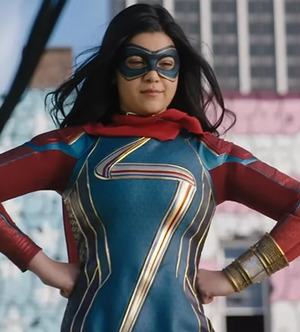
Guys, characterizing your blorbos as queer is great and all, love it, but you're making a fundamental mistake by making their clothing choices the foundation for your queer headcanons, especially when it comes to male characters. Do not apply existing western cultural ideas regarding male clothing onto South Asian characters and their dressing please.
The vast majority of the clothes being used by people in various online spaces as 'evidence' of a character being queer(gay or bi mostly) are just normal Indian clothing for men, like daily wear. A top being pink or a character's wardrobe being mostly pastel means absolutely nothing...cos Indian clothing tends to be colourful in general and the tendency to ascribe colours masculine and feminine qualities is considerably less in the subcontinent. I'm not saying it doesn't exist, but generally not a concern.
There's also this pervasive idea that colourful clothing = flamboyance = queer and that itself is something many people have already pointed as a deeply flawed way of thinking and a stereotype. Furthermore, even if you do lean into the archetype of queer men being flamboyant, subscribing to the 'stereotypes exist for a reason don't they?' school of thought perhaps, there's also the fact that ideas of what is considered flamboyant change dramatically across different cultures. What is 'flamboyant' for someone might just be normal for others. Like maybe pink or purple or yellow might be considered too much, unmanly, emasculating etc in the US or something but they're just perfectly normal colours for men to wear in many, many cultures.
It's the 'Is he Gay or European?' principle. Did you characterize this Indian character (or any South Asian character really) as queer because of their canonical behaviour and portrayal, or did you just see their clothing and decide they're queer because being well groomed and having a colourful wardrobe is a character trait you exclusively ascribe to being queer?
Like guys, I like Chaipunk like the rest of you, but if you consider Pavitr queer just because his costume is a lot fancier than the others' (An actual take I've seen multiple times) without taking into account his cultural background....¯\_(ツ)_/¯
Let me make this clear, I don't think people need a ten page analysis to imagine their fave as queer. Headcanoning a character as queer can have any reason ranging from 'I said so and so it is' to 'this is my light character analysis that makes a masters thesis look shabby' and they're all valid and an integral part of the fandom experience. What I am annoyed at are these so-called 'well-researched' theories that did not make the slightest effort to look into South Asian culture and simply transposed their western bias onto Indian media and confidently make flat out wrong judgements and mislead other people. Clothing based sexual identity determinism is the least of it. That I can at least understand through the lens of a habitual process built through years of analyzing crumbs of queer representation available only through queer coded characters and symbolism such as clothing choices being the only way to see an aspect of yourself portrayed in an aggressively heteronormative media ecosystem. I do that too, because media is tragically heteronormative everywhere. But the rest? Its just straight up misinformation and misrepresentation touted as truth.
Its the same with relationships between men. There are plenty of cultures where skinship between men is not unusual and dynamics and nuances tend to be vastly different from western representations of male friendships. In xianxia and wuxia fandoms you can see this same problem in a different font when outsiders, most often the western side of the fandom, try to apply their own standards and morals onto the original work and try to interpret it through a lens it was never supposed to be interpreted through in the first place, except maybe for comparative analysis. This practice itself isn't a major problem, its natural for people to apply what is familiar to them to try and understand something new. But when this is also accompanied by them foisting their personal interpretation and analysis as the 'correct' one and trying to impose it on the fandom as a whole, it escalates into a powder keg situation as you can imagine.
Again, not saying that western parts of fandoms are the root of all evil or anything like that, gods know how toxic netizens can be. But in this specific situation, where people try to impose western ideals on to non-western content and assumes the universalism of their own principles and value systems? Indeed an issue to be addressed.
#ATSV#South Asian Characters#Desi characters#South Asian culture#Desi Culture#Fandom analysis#LGBTQ+#Brown culture#Spiderman: Across the Spiderverse#Pavitr Prabhakhar#Hobie Brown#Chaipunk#RRR#Miss Marvel#Tagging Miss Marvel and RRR only because they're in the intro-two pieces of media that are good examples of the increased attention-#on South Asian characters and Indian cinema#Not included in the body of the post except under umbrella terms like South Asian character/South Asian media & other such categories
232 notes
·
View notes
Text
I understand both the capitalist nature in which Barbie (2023) exists in, and the reasons why it was made— advertisement, product placement, money for big corporations; a western lens of the story being told.
But I also know who I am and what my morals are. I have a deep understanding and security within myself, enough to say that I really loved that movie, and it will likely be one of my faves for a long time. It’s message rang true and resonated with me in a way I’ve never felt before and for that, I am in awe of this film.
Love and criticism can co-exist— in fact it’s important that they do. It’s the love for something that allows space for understanding and critical analysis, and it’s the love for something that fosters a safe space for that media’s message.
I feel my blog is a safe space for Barbie lovers and for Barbie critics— but not for Barbie haters. I feel as if genuine hate for this film does not come from a good or flexible place of understanding or critique, and I unfortunately don’t have the capacity to experience the endless might and possibility of humanities hatred for something I adore.
Please, if Barbie wasn’t for you, then neither is this blog!! And that’s perfectly okay < 3
#barbie movie#barbie#barbenheimer#oppenheimer#film critique#movies#movie critique#safe space#Ken#Allan#this is genuine#we’re all only human after all#but we’re all#kenough#you are kenough
170 notes
·
View notes
Note
Can I ask your opinion on answer to this : https://www.tumblr.com/gojuo/742796780522061824/is-satosugu-a-queerbaiting-ship?source=share ?
for reference, this is the post anon is talking about. feel free to check it out for context before reading my response.
this person is basically saying that stsg cannot be romantic because there is no romance depicted between them onscreen; all of their interactions are meant to be regarded through a platonic lens because it's never explicitly indicated (in canon) to do otherwise.
this goes back to the whole idea of "projecting" queerness onto geto and gojo despite them being queered already, which i've touched on before. i'm going to respond to this person's ideas in two main parts: 1) queerbaiting and 2) canon, alongside the idea of "shipping".
as an idea, queerbaiting refers to the marketing technique employed by creators and publishers to increase a media's appeal, achieved through teasing a queer connection between two characters romantically unentangled in canon. queerbaiting dangles the proverbial carrot in front of the audience only to snatch it back with forced love interests or open declarations of brotherhood. it operates along the binary of friends/heterosexuals and queered/romance, dangling the carrot in front of the latter only to resolutely plant their feet in the former.
shockingly, i actually agree with this person— gojo and geto are not queerbaiting because they are queer-coded. the blatant difference between baiting and coding is that the former uses the appeal of fetishism as a marketing mechanism and the latter employs subtextual traits, literary devices and narratorial mechanisms that are recognizable as queer without being stated outright.
queerbaiting is always negative; it operates through stereotypes and functions to create the illusion of representation to ultimately reify the sex/gender binary. queercoding, on the other hand, functions in a more neutral space to create all forms of representation. (although western media has historically queercoded villains, which is an example of negative mechanization).
when engaging in discourse around queerbaiting, it's important to remember that queerness does not present uniformly across borders and time periods. when we seek open declarations of love as affirmations of queerness, we are seeking western representations of queerness, which are often founded in romantic love. the person who wrote this post is engaging in a solipsistic analysis from a western perspective, a perspective of which too often assumes the 'default' in anglophone fan spaces.
gojo and geto are not meant to be interpreted through a western lens because they are not borne of the west. applying a western conception of queerness to them as a barometer is unfair, incongruous and downright disrespectful to their characters. it's akin to shoving a box into a circular hole and declaring the box at fault for not being able to fit. simply because gojo and geto do not fit your static conception of queerness does not negate the core tenets of their characters that can only be understood through a queered lens, albeit a non-western one.
this brings me to my second point, which regards conceptions of canon and the practice of shipping. this person applies the same binary to fandom/canon spaces as they do sex/gender, dichotomizing jjk media into 'source' materials and 'fan-generated' content, much of which they relegate to the "stsg shippers [that] forc[e]their headcanons down your throat and manipulat[e] you into believing that shit".
a guiding principle amongst purists of any media is that there is "original" and "unbastardized" content, and then there are fan "mutilations" of said content that come after. they maintain a sanctimonious attitude and imply that people who engage in bastardizing media therefore understand the "source" content to a lesser degree (a requisite qualification to engage in mutilation).
in polarizing fan content and 'source' content, purists willfully blind themselves to the true essence of media— it does not exist independently of the imagination of the populous, it is made and continues to be made of the populous' imagination itself. once created, each re-imagination is not adjunct to the 'source' material but rather an extension of it on an equal ontological plane.
functioning less like an island in the ocean of our worldly milieu, media is more of a current, pushing and pulling on different sociocultural forces and being shaped by them in return. regarding it in a puritanical manner is a perversion of its nature because media does not merely live in the world, it becomes the world around it.
this person divorces so-called 'fan' content from 'original' material, and derisively declares that "Theories you read? That's fandom. Art you reblog? Fandom. Memes you consume and regurgitate? Fandom. Sending me asks about JJK? You're engaging in fandom". in doing this, they fundamentally do not understand that the two are inseparable because they are co-constitutive. jjk is fandom, and fandom is jjk.
fan culture is not supplemental to 'source' content; it a manifestation of media achieving its intended purpose, which is to join the world that bred it. fandom is perhaps the highest form of intellectual engagement with jjk because it executes the understanding that media exists within the world and not outside of it.
the things fans create are not inferior or antithetical to the 'source' media; however, i'm not saying that they're all inherently favourable either— they can be anything because they can just be. media invites itself into our world and in doing so, sends an amorphous invitation back. when you pompously declare that "in canon there is no romantic love between those two and there never has been", you slap the hand that extends itself to you and defy the maxim of media: it is not prescriptive, it is participatory.
when people acknowledge that gojo and geto are queercoded and choose to understand their coding in a romantic context, they are not "forc[ing] their headcanons and misinterpretations of the material down everyone's throats". they optimize media's purpose and reach back towards the waiting hand of fiction instead of isolating jjk and forcing it out of the creative medium that birthed it. "shipping" is one form of engagement amongst many, and is a reductive term that belies the intricate textual analysis required to arrive at its conclusion.
one key dimension of the "shipping" discourse is that it's mainly conducted by people who aren't men. men, in principle, are used to dominating every discursive space. to them, it is utterly flabbergasting that people who aren't them might have more insight into their favourite media than they do; nuanced and complex insight at that. compressing the discourse about stsg into "shipping" is reductive and disregards the complex conceptual and narrative analysis conducted to reach the so-called "shipping" conclusion, a practice which requires analytical capabilities that elude the men who deride them.
maybe the people who are "annoying as fuck" are not the "stsg shippers" but the people who insist on interacting with jjk in a purely prescriptive context, clinging to a vacuous relationship with their favourite media and removing themselves from its most authentic, intellectual and enjoyable facet in the process.
#my jjk thoughts#sorry for the long ass ramble i had many thoughts lmfao#ask#stsg#satosugu#jjk#jujutsu kaisen#satosugu analysis#satosugu meta#stsg brainrot#jujutsu kaisen analysis#jujutsu kaisen meta#queer discourse#lgbt discourse#fandom culture#fandom discourse#jjk fandom#gojo satoru#geto suguru#gojo x geto#satoru x suguru#satosugu brainrot#queer fiction#queer discussions#shipping discourse#shipping things#fan culture#queer media#queer jjk#queer jujutsu kaisen
46 notes
·
View notes
Text
On Grim Spectacle and Greatest Fears
There's a reason Enchanting Grom Fright is beloved by fans of the Owl House, not only is it just a plain old good story, it's also a phenomenal queer story.
But why is that so, and what makes it so important? That's what this post is about.
And if you're wondering whether I'm going to talk about @moringmark in this post, you bet I am.
Let me explain.
SPOILERS AHEAD
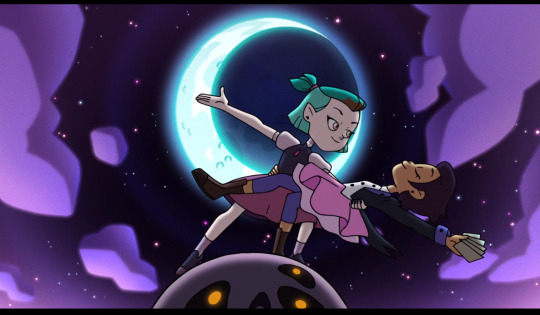
If you look at online discourse, there is a lot of discussion about "good representation" and that is certainly an interesting discussion, but I don't think there is much explanation as to why representation is important in the first place. It is a good thing, we all know this, but why?
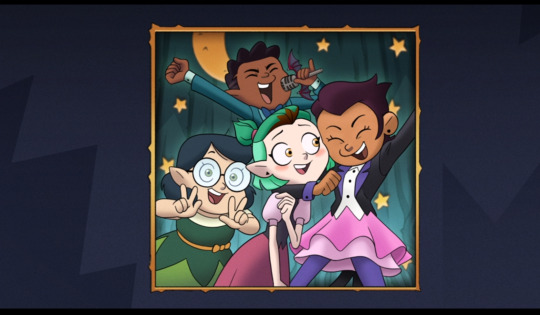
One word: Normalisation. Representation of varying identities, cultures, and ethnicities is important because it takes apart the implicit bias inherent in society.
The generic individual in western society is white, male, and straight, and while there is nothing wrong with these character traits, this means that anything added to that template becomes a statement. It becomes an important metaphor for the story which doesn't get applied to someone with the three characteristics I mentioned earlier.
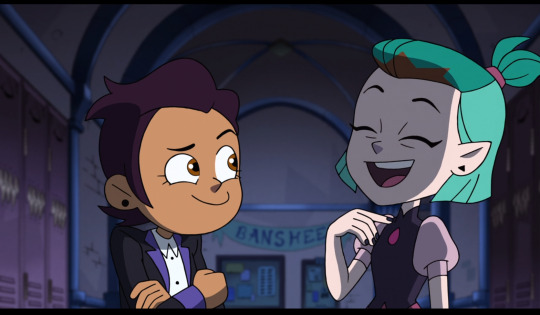
For example, there is a question in analysis of what a character being gay does for a story, where a character being perceived as straight doesn't get that level of scrutiny.
This is a problem for a number of reasons, most notably it abnormalizes certain traits that a large proportion of society (myself included) exhibit, effectively othering those people as a result.
Representation does the opposite of this, it allows real people who are not the generic individual to be treated with the same level of respect and for audience members who don't usually see themselves in media to find characters like themselves, to see their own stories reflected in fiction.
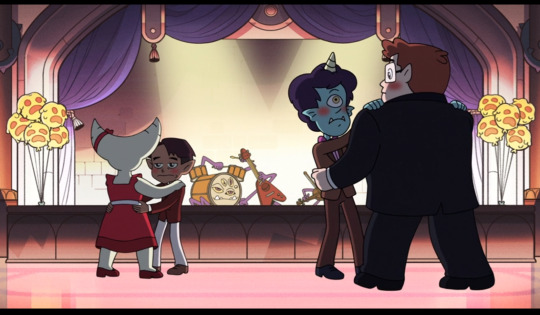
I think the best reason for representation actually comes from Ordinary, by Joriah Kwame, the sequel to Little Miss Perfect. This song, written explicitly from Luz Noceda's perspective, says this:
"The characters I read never act or look like me
I can't depend on them to lead me through the right door"
Stories are a way of learning about the world and yourself, and in stories with extremely low representation for marginalised people, that lesson is pretty clear.

@jameswoodall has a video essay on YouTube titled How Much Representation Is Enough. In it Woodall discusses the benefits of representation through a queer lens, and argues about the end goal thusly:
"It's not about achieving a certain percentage. It's about making that percentage stop mattering. When queer representation is no longer noteworthy. When queer inclusion is so naturally assumed that nobody feels the need to count anymore. When even if we did put queer rep in every story, nobody would bat an eyelid. Because we have just as much right to be there as anyone else."
So, let's talk about Grom.

Meromorphic is a channel with a two-hour long video about The Owl House as a whole, and while there is a lot in that video that I disagree with (as is the nature of media analysis) it is comprehensive and fascinating, and I would recommend giving it a watch.
However, I am not bringing up that video to talk about its points, instead, I would like to shamelessly steal borrow a term from it: Magic Literalism. In this context, it means when a piece of media uses magic to make physical an intangible concept. In this case, it turns fear into a monster, that being Grom.
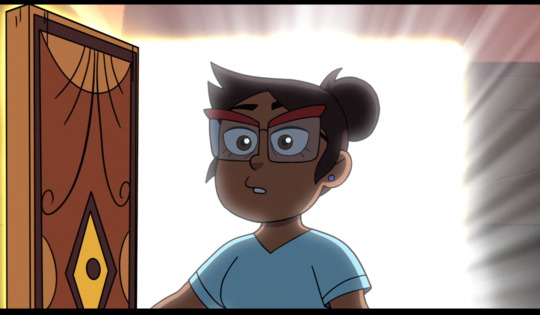
When Grom looks into Luz, she sees Luz's mother, and she sees Luz's fear of disappointment. She sees that Luz has a secret that she hasn't told her mother in case she breaks her heart. It's literally about the Boiling Isles, but there's something written between the lines here.
It is possible to read this as Luz's fear of coming out to her mother, and by "it's possible", I mean that this is how I read this.
Coming out is terrifying, even if you have supportive parents, it's still asking people to accept a part of you, and that comes with risk, because if they don't accept you, what do you do?
That's what I think Luz is afraid of.
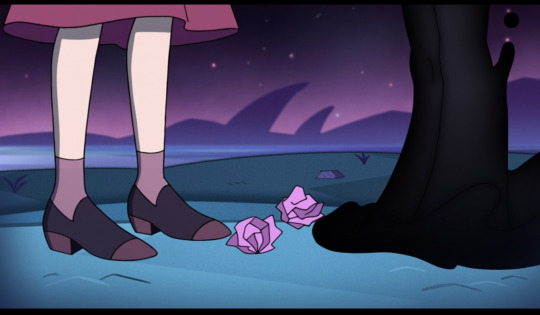
Amity, on the other hand, is afraid of getting rejected in a similar way, although hers is more direct. Amity is scared of falling in love and not being loved back.
As a side not, I think it's a really cool detail that of Odalia's many flaws, homophobia isn't one. As in, Amity isn't afraid of coming out to her parents, and when she makes passing remarks about having a girlfriend to her mother and father, their surprise is that it's with Luz, not with another girl. Bellos kind of keeps this going, and the message with that is clear. Homophobia is too low, even for these villains.

Anyway, Amity's experience with Grom is the other side of being queer, the romantic part. I am aware that romance isn't something everyone experiences, but when you do, especially when you are queer, confessing your feelings for someone is terrifying.
So, Amity avoids the question and doesn't really confront it directly at all. Even at the end of the episode, she has everything thrust upon her and still doesn't confess. Luz does the same thing with her mother. Fear is a powerful force, and I would argue that the best time to deal with it is when you are ready, not before.
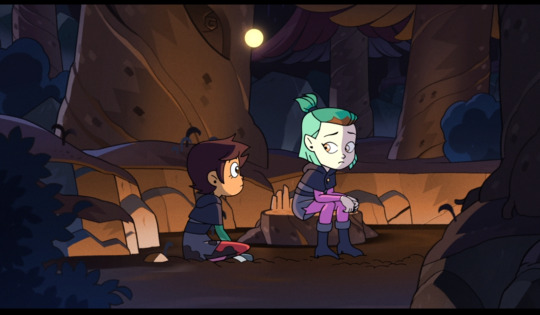
I really like the scene in the forest. The light gives the two a feeling of warmth and safety, and it wards of the night. Once again, it's Luz giving hope to those around her, and here it is in a more personal sense. Light, do not falter.
The colour palate of the scene (that warm light) conveys that these two people are comfortable in each other's presence and can talk freely around each other. They are already in love; someone just needs to say it.
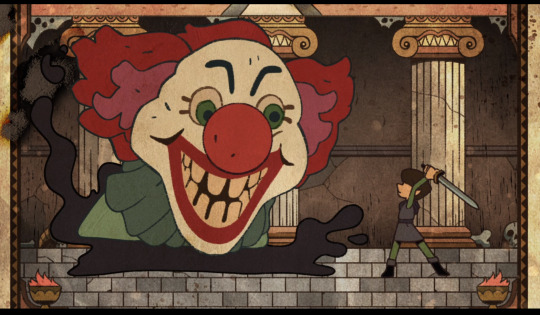
However, there is another side to Grometheus that also factors into being queer. When Amity explains the event, the art style changes into this style that I want to call classical, even though it probably isn't (art nerds, rise up in the replies and tell me what this is please). But she also directly calls the Grom event a tradition.
"Every year it tries to break out and a student has to defeat it before it invades town. Ever the optimist, Bump holds a party and calls it tradition."
Perhaps tradition, at least in the Boiling Isles, isn't all that it's cracked up to be. Perhaps there is an issue with seeing a problem and instead of trying to fix it, stalling it and making a spectacle out of achieving nothing. Maybe there is an issue with willingly putting children in danger for the drama of it. Maybe the fact that certain sports are just the audience enjoying people getting life threatening injuries might be an issue. I'm just throwing ideas out at this point.
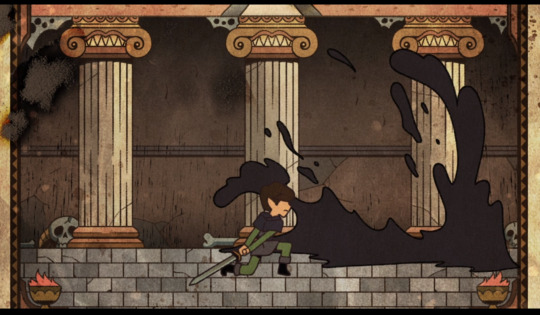
If we link Grom with fear, there is the idea that fear spreads from schools and it is the role of the students, as decreed by the adults, to contain it. See the plot of Footloose for an example of this, or certain places in the real world today, where fear of the other (mainly bigotry) takes the form of arguments about schoolbooks.
This is a valid reading, but I'd like to go a bit wild with my interpretation and talk about @moringmark's comics.

Chapter three of A Little Hint of Blue is a brilliant piece of storytelling that actually characterises Bosha a ton. It carries the theme of fear over to both Skara and Bosha, but it shows them in real time. Skara is scared that Bosha won't let her spend time with... (*checks notes*)... Fledermaus?

She has good reason for this, Bosha is overprotective to the point of toxicity and runs on her own fear. Bosha's hierarchical worldview comes from a place of fear as well, she's afraid of being out of control, and a really subtle thing that gets done in this comic is the association of Bosha with fire.

It doesn't really get done in the original series, but Bosha and fire are such a neat thematic paring. They both consume, they both try to reach out, and fire is heavily associated with strong emotions, like anger and fear.
Bosha tries to control everything in the same way she controls her flames, but as it turns out, people aren't fire. People, when they are free, don't immediately destroy things, and a lot of people actually benefit from that freedom. Most notably, artists and musicians, like Skara.
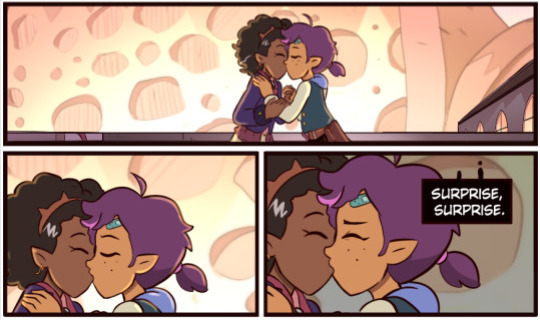
Grom Factor also deals with the subject matter, but from a slightly different perspective.
First up, the most obvious, at least to me. Enna saves the town but it outcast in the process because what she is scares people, despite her heroism, she is not accepted. The metaphor isn't perfect and reading it as a one-to-one analogy is a detriment to the story. For example, the reason for Enna being outcast is because of a curse, and queer people are generally not magically cursed to be queer, they are born that way.

But, there is also the idea of Luz's fear as an adult being the exact same as when she was a child. She is scared of disappointing people, specifically her family and her daughter. This means that she is acutely aware of Ayzee's own mirror of that, and this line is spectacular:
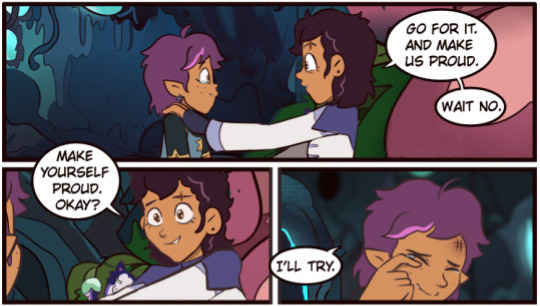
"Make yourself proud"
It's ok to be afraid of what others think, that's part of being human (or a witch, or a demon. It's part of being sentient), but in the end, the only person who you have to make proud, is yourself.

Final Thoughts
I've been dying to talk about the Moringmark comics, and I do plan on talking about them more, but that will happen when I get there. I will do more gushing about their serious artistic and storytelling skill when that happens, so buckle up.
Enchanting Grom Fright is one of my favourite episodes of the series as a whole, and its a testament to the writing of it that there is more that I am yet to cover, and more that I am discovering as I watch it. For example, the storyline with Gus and King is a big part of the episode, but I didn't mention it because it wasn't really relevant to my main point, and the whole thing with the dance is stellar.
Next week, I am looking at Wing It Like Witches, so stick around if that interests you.
Previous - Next
#rants#literary analysis#literature analysis#character analysis#what's so special about...?#the owl house#toh#toh luz#toh lumity#toh amity#the owl house luz#the owl house lumity#the owl house amity#moringmark#lgbtq#lgbtqia#queer community#queer
63 notes
·
View notes
Text
Seeing fan discussions about Blue Eye Samurai and especially Mizu's identity is so annoying sometimes. So let me just talk about it real quick.
First off, I have to emphasise that different interpretations of the text are always important when discussing fiction. That's how the whole branch of literary studies came to be, and what literary criticism and analysis is all about: people would each have their own interpretation of what the text is saying, each person applying a different lens or theory through which to approach the text (ie. queer theory, feminist theory, reader response theory, postcolonial theory, etc) when analysing it. And while yes, you can just take everything the authors say as gospel, strictly doing so would leave little room for further analysis and subjective interpretation, and both of these are absolutely necessary when having any meaningful discussion about a piece of media.
With that being said, when discussing Blue Eye Samurai, and Mizu's character in particular, I always see people only ever interpret her through a queer lens. Because when discussing themes of identity, yes, a queer reading can definitely apply, and in Mizu's story, queer themes are definitely present. Mizu has to hide her body and do her best to pass in a cisheteronormative society; she presents as a man 99% of the time and is shown to be more comfortable in men's spaces (sword-fighting) than in female spaces (homemaking). Thus, there's nothing wrong with a queer reading at all. Hell, some queer theorists interpret Jo March from Little Women as transmasc and that's totally valid, because like all analyses, they are subjective and argumentative; you have the choice to agree with an interpretation or you can oppose it and form your own.
To that end, I know many are equally adamant that Mizu is strictly a woman, and that's also also a completely valid reading of the text, and aligns with the canon "Word of God", as the creators' intention was to make her a woman. And certainly, feminist themes in the show are undeniably present and greatly colour the narrative, and Episode 4 & 5 are the clearest demonstrations of this: Mizu's protectiveness of Madame Kaji and her girls, Mizu's trauma after killing Kinuyo, her line to Akemi about how little options women have in life, and the way her husband had scorned her for being more capable than him in battle.
I myself personally fall into the camp of Mizu leaning towards womanhood, so i tend to prefer to use she/her pronouns for her, though I don't think she's strictly a cis woman, so I do still interpret her under the non-binary umbrella. But that's besides my point.
My gripe here, and the thing that spurred me to write this post, is that rarely does this fandom even touch upon the more predominant themes of colonialism and postcolonial identities within the story. So it definitely irks me when people say that the show presenting Mizu being cishet is "boring." While it's completely fine to have your opinion and to want queer rep, a statement like that just feels dismissive of the rest of the representation that the show has to offer. And it's frustrating because I know why this is a prevalent sentiment; because fandom culture is usually very white, so of course a majority of the fandom places greater value on a queer narrative (that aligns only with Western ideas of queerness) over a postcolonial, non-Western narrative.
And that relates to how, I feel, people tend to forget, or perhaps just downplay, that the crux of Mizu's internal conflict and her struggle to survive is due to her being mixed-race.
Because while she can blend in rather seamlessly into male society by binding and dressing in men's clothing and lowering her voice and being the best goddamn swordsman there is, she cannot hide her blue eyes. Even with her glasses, you can still see the colour of her eyes from her side profile, and her glasses are constantly thrown off her face in battle. Her blue eyes are the central point to her marginalisation and Otherness within a hegemonic society. It's why everyone calls her ugly or a monster or a demon or deformed; just because she looks different. She is both white and Japanese but accepted in neither societies. Her deepest hatred of herself stems primarily from this hybridised and alienated identity. It's the whole reason why she's so intent on revenge and started learning the way of the sword in the first place; not to fit in better as a man, but to kill the white men who made her this way. These things are intrinsic to her character and to her arc.
Thus, to refuse to engage with these themes and dismiss the importance of how the representation of her racial Otherness speaks to themes of colonialism and racial oppression just feels tone-deaf to the show's message. Because even if Mizu is a cishet woman in canon, that doesn't make her story any less important, because while you as a white queer person living in the West may feel unrepresented, it is still giving a voice to the stories of people of colour, mixed-race folks, and the myriad of marginalised racial/ethnic/cultural groups in non-Western societies.
#blue eye samurai#mizu blue eye samurai#fandom critical#blue eye samurai meta#wank.mp3#shut up haydar#fandom.rtf#this is a bit of rant but the prevalent whiteness of fandom in general just gets on my nerves i'm sorry#giving me flashbacks to a:tla fandom fr cuz it's the same shit! people love to devalue the stories of non-white non-western identities#also to be clear i am a southeast asian living in southeast asia and similar to mizu i am often alienated for having mixed ethnic ancestry#and even for speaking english (bcs my granddad served the fuckin. british colonials. so my fam speaks mostly in english)#cuz where im from it's still extremely hegemonic racist patriarchal misogynistic homophobic like the setting in the show#so like even though the story is set in historical japan and may seem far-removed from the experiences of a US or european audience#those of us outside the west and in the global south still face a lot of the struggles that mizu goes through till this very day#so please dont just dismiss that. it feels incredibly tone-deaf#okay rant over
58 notes
·
View notes
Note
would it be accurate to say that price would be the lesser of two evils between him and graves? cuz i feel like the lesser of two evils is just a way to justify the lesser actions even tho they’re still bad so idk just a random thought i had :) and you seem like the smartest person to ask
Addressing this issue requires splitting analysis of Price's character into two parts--analysis of his characterization as per the game's intention and through a real-world lens.
Because Call of Duty unequivocally does not believe Price is "evil" at all. We are shown that Price's actions are always justified by the narrative--those actions being using civilian noncombatants as bargaining chips in interrogation, disobeying direct orders from his immediate superiors, threatening his immediate superiors, and conducting various off-the-book operations with absolutely zero oversight.
With each crime Price commits the game presents us with equal justification: Price gets valuable intel from the subject of his interrogation. Price's fury is on behalf of his marginalized comrade. Price's disobedience and unsanctioned activities end up saving a lot of lives. The story shows us that Price is a good man, who recognizes when the powers that be use the powerless to achieve its own ill-gotten ends. In context of the game, Price is a good man--mercurial, volatile, but good.
But you have to remember that this is fiction written by real people who are fully bought into the hero narrative of western military. Price is a good man because the company that produces Call of Duty believes that real men like him are good men. And I must be blunt: they are not.
There is a chain of command in the military for a reason. Many people are involved in deciding where men like Price go and what they do because (in some cases) harm reduction really is the collective goal, and Price's emotions and personal opinions about a given situation absolutely cannot be a factor if that goal is to be met. The red tape that you often hear characters like Price complaining about in media like Call of Duty is there to keep innocent people from getting caught in the crossfire.
This is no praise for the military, by the way--just an illustration of a broader point. Western history has been shaped by "one great man" narratives, stories about powerful men with godlike proficiency for war and imperialism who shape the world at their command alone. We are told that men like Price are the ones who hold the world together, and that the collective decisions of the groups of people he is beholden to hold him back from doing that.
In truth, men like Price are the ones who destroy the world. The US worshiped at Kissinger's altar for his tactical acumen, and ignored the fact that he was directly responsible for the deaths of hundreds of thousands of people and the destruction of enormous swathes of populated, cultivated land. Kissinger operated with absolutely no oversight, and several countries around the world still have not recovered from the ruin he wrought throughout the course of his career.
So--are we meant to interpret Price as the lesser of two evils? By the game's standards, no. Graves is the bad guy who hurts people, and Price is the good guy who saves them. That is the beginning and ending of Modern Warfare's thesis. We, as consumers of Modern Warfare, have to evaluate the morality of Price's actions, inserted into a real-world context, on our own, and few people are equipped to do that. Few people are given the tools to critique media effectively in the way I do, because ignorant consumers are easier to market to and easier to sway politically.
26 notes
·
View notes
Note
Hey, do you have any info or tips on diy medicine? I've always been interested but haven't found much success
Medicine is just problem solving. IME it's important to take nothing for granted and get as granular as possible with what you're trying to achieve, because that opens more doors.
Re: that point, diy med is being a medical researcher. Very rarely is work done for you, so there's a lot of fucking around and finding out--how much risk you chose to take is up to you in experimenting; but I'm pretty gung ho and I can still count on one hand the number of times I've tried something that carried more risk than over-the-counter acetaminophen.
Read voraciously--coming from someone who can only get thru about three books a year. It's fucking hard but it is so beyond worth it to work at it, however much you can. Read until you know enough to have questions and then read to find the answer to those questions and/or figure out how to determine an answer for yourself.
Bad sources can be just as educational as good ones--western medicine has a bunch of fuckshit in it and having strong, grounded analysis of why you think an approach, treatment, whatever is bullshit will help you in finding something better.
Anecdotal evidence is useful as FUCK. Western medical practice is regulated formally and informally by legal anxiety and profit motives (ergo an unwillingness to produce anything under a certain statistical bar of effectiveness) but for a LOT of anecdotal home remedies and experimental treatments, risk factors are p minimal and if you feel comfortable trying it based on a realistic risk assessment...you can just try it, lol.
I really want to stress that diy med doesn't just have to be about trying to get a sub-par approximation of western med. Sometimes what we can do for ourselves is limited or less effective, sure--but we are also capable of doing better. There's pros and cons, right, but autonomous medicine gives the opportunity to try something that a doctor never would--sometimes because of risk, but more usually it's about legal anxiety and state restrictions. I remember hearing someone I knew who worked in drug development talk about how stupid it was that their team was having to reinvent the wheel instead of using THC in a drug; even though there exists documentation that THC has the property they were after, their program got federal funding so no marijuana.
Personally my entry point was herbalism and it's not a bad route to go. It can do a LOT, it's very accessible, and unlike a lot of medicine it's less gatekept & there's a significant population of writers creating resources specifically for laypeople with a focus on autonomy and self practice; plus rad community spaces exist and ofc like any scene they're full of bullshit (transmisogyny and gender essentialism in lefty alt health is a huge current, unfortunately), but they can be a good place to like. Network until you actually find the other ppl on the fringes of the scene who you might actually click with. An herbal background also gives you a LOT of directional freedom--lots of sources will combine western medical information on top of traditional and anecdotal practices, which cumulates in a lot of lenses you can apply to try to solve a problem; plus a lot of drugs are or can be plant-derived and having a skillset to identify/grow, harvest and process plants is really useful even if western medicine is the primary lens you want to use (tbh ur basic herbal preparations are often the first step in more exact drug isolation procedures). It's also just essential imo to have more than a western medical perspective--take time to read less immediately practical texts about medical history, other medical systems, and other conceptualizations of illness and the human body. One of my hotter takes? Miasma theory is still relevant and useful. There's a lot of fuckshit everywhere, both within and outside of western medicine--treat no source as authoritative and every claim as a thought experiment! But seriously, take the time to see what's out there. Accumulate as much raw information as possible to build your toolkit.
Some herbal resources I like for beginners (all books on LibGen.is)
Rjwhelan.co.nz -- aoteroa based medical herbalist who presents a really wide range of info from historical/traditional to western scientific. He's got some interesting (read: bad) takes but is a solid writer and information aggregator.
The herbal medicine makers handbook by James green -- good intro to herbal preparation with a range of procedures from simple folk methods to more measurement and chemistry heavy. Also got some weird opinions. That's just kinda how it be.
Wild remedies by rosalee de foret and Emily han -- cute basic introduction to herbalism
The psychopharmacology of herbal medicines by Marcello spinella -- says it right on the tin. useful reference.
The Earthwise herbal (vol 1 and vol 2) by Matthew wood -- listen. I fucking hate this man. I kind of hate these books (organized alphabetically by latin name...come the fuck on) BUT. It is still a pretty ok reference book with a similar approach to Richard Whelan's work and it has herbs that I've had trouble finding in other texts.
On working with others and sharing information: it's important to not play doctor. I strongly encourage folks to help out other people, but in an assistive capscity--not a prescriptive one. Share your sources, explain your opinions! The goal is to offer as much information as possible for someone else to make their own decisions. If you're in the US, this is a pretty good rundown of the legal positionality of herbalists (/health consultants generally) but I strongly advocate for going further than the law in this case on ideological autonomy-focused grounds.
Finally: medicine is not a solitary undertaking. Having a group of friends or even just acquaintances with different needs, priorities and viewpoints will get you much further in a few months than you could on your own in years. And it's slow going at first. It really is. You'll fuck up, you'll go around believing something for years to suddenly realize it's bullshit, you will grow and change. But you'll get there.
54 notes
·
View notes
Text
On narrative, Romance, and The Witch from Mercury
I’ve seen a bunch of posts bemoaning people who don’t seem to feel that the relationship between Suletta and Miorine is either explicitly romantic or that it’s final, married state makes sense given the events of the narrative. I find it absolutely fascinating that anyone can watch that show and not see how their relationship blooms into something very obviously romantic. Like, from the narrative itself, to the way it is structured, to its themes, one of the show’s main preoccupations is Miorine and Suletta’s romantic feelings towards one another (another is Suletta’s mommy issues, a thing lesbians are famously immune to). So in order to rectify what appears to be a major crisis of media illiteracy, let’s talk about narrative, romance, and The Witch from Mercury.
Let’s start with narrative.
In studying literature at the high school level, students in the Anglo-sphere world are often shown some variation of this diagram:
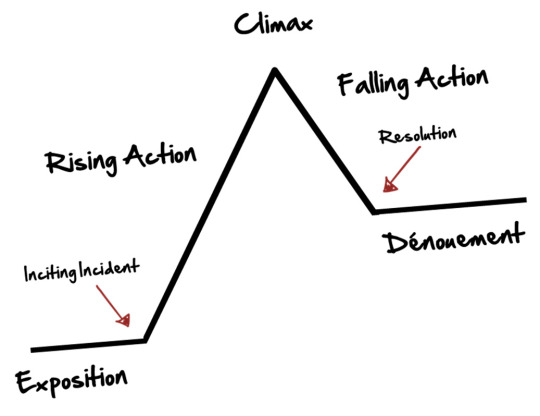
(Graham, 2014)
This diagram can be roughly broken into three sections: beginning (exposition, inciting incident), middle (rising action, climax), and end (falling action, denouement). Those who haven’t seen this particular diagram are likely familiar with the beginning-middle-end narrative structure, perhaps having even been told that this is the structure of all narratives (it isn’t, but that’s not really relevant here). The origin of this way of thinking about narrative in the western tradition is Aristotle’s Poetics, a treatise on aesthetics and tragedy. However, when we learn about this narrative structure in school, there is often an important aspect of Aristotle’s argument that gets left out. What he’s actually describing is not a narrative but rather an action. Actions, he argues, have a beginning, a middle, and an end and good narratives are ones that imitate one complete action. This process of imitation is known as mimesis (Ricoeur 1984, 33-34).
Reframing our beginning-middle-end structure with this context leaves us with two important takeaways. The first takeaway is that this structure views a narrative as a singular action which can be analyzed as having a beginning-middle-end structure. The second takeaway is that this structure is critical. This means that it has a valence of aesthetic judgement such that we can judge the aesthetic value of a narrative by its coherence with the structure. Now, this is not the only critical lens through which to view narratives, nor am I suggesting it should be. Rather, it is a relatively easy to understand structure that provides a useful frame of reference for interpreting the particular narrative we’re interested. Further, a narrative can itself be broken up into actions which can in turn be analyzed using this structure. Thus, with a work as complex as a television show, you have actions within actions all of which can be broken up into the beginning-middle-end structure. To expand on this account Aristotle (and Ricoeur, whose exegesis and analysis of Aristotle I’ve cited) provides, we have to next ask what ‘action’ actually means in this context.
To answer that question, I want to turn another philosopher, Hannah Arendt. In her excellent book The Human Condition she describes three kinds of things that humans do which define the human condition. The first is labour, which she defines as those things which must be done continually because they have no real end. Eating, drinking, and sleeping can all be thought of as kinds of labour on this view because no matter how many times we do them, we will still need to do them again. Labour alone cannot define the human condition because all living things also preform repetitive tasks to survive. The second thing humans do is work. Unlike labour, work has a definite beginning and end. However, what distinguishes it from the last category of human thing is that the end of work is always known before hand. Making a table is work because you start off without table, you finish with a table, and all along you know that you will ultimately have a table when you’re finished. The third and final thing is the one that Arendt believes most defines the human condition: action. Action has a beginning - a point at which the action is set in motion - but its end is undefined. Taking an action is thus a sort of risk. It demands we set out to do something without any certainty about the outcome and that we do so precisely because we are not certain as to the outcome. Without getting too far into the weeds, Arendt maintains that action can only exist within contexts structured by social relationships. Basically, taking action requires the involvement to some degree of other people. Actions also live beyond us. Their relational existence means that they have a ripple effect upon those who exist in relation to the actor. One action will inevitably beget further actions in response (Arendt 1998).
For our purposes, we need to understand how work, action, and art intersect. Art is a product of action but is itself a sort of work. The artist sets out to make an artwork with an idea of what it will be like, but often finds that it changes along the way. Further, the artwork lives beyond the artist, inspiring actions on the part of audiences and critics. However, the work of art itself has both a definite beginning and a definite end. Paintings have canvas edges, films end, and you eventually leave a building. So while being the product of action art can only ever imitate it. Thus, we find ourselves right back at Aristotle and the beginning-middle-end structure. Would it shock you to learn that Arendt was an Aristotelian? No? Good.
Okay, bluh, now you’ve read through a bunch of aesthetic and social philosophy as well as literary theory. As a reward, let’s apply the structure to GWitch.
Now, let’s start by asking ourselves what the overarching action the narrative of the Witch from Mercury is emplotting? I would argue it is Elnora’s attempt to create a new world for Ericht. Why? Well, the prologue sets up Elnora’s motivations, which are revealed as the tension ratchets up, and then narrative concludes when she fails. We know this is an action (thus worth narrativizing) because Elnora sets it in motion with a desired end in mind but no certainty that she will achieve it. She is taking a risk. For anyone wondering, this is one reason why Suletta and Miorine don’t get dramatic confessions or a marriage scene. The show is, ultimately, not actually about their actions, it’s about Elnora’s. However, the show seems to focus on Suletta, Miorine, et al because the overarching action cannot move through its beginning-middle-end structure without conflict, which the students provide. Thus, it structures the show by providing a ground out of which the rest of the characters actions can grow. These actions too can be understood through the beginning-middle-end framework and are worth examining as well.
The one we’re obviously most concerned with is the relationship between Suletta and Miorine. Wait. Is a relationship an action, in the relevant sense?
Yes.
Relationships require other people, so check. They involve both risk and uncertainty, so check. And they have no definite end, so make that three checks. In colloquial language, it might seem strange to call something as complex as a relationship an action, but in the technical sense we’re concerned with, it is. Isn’t philosophy fun?
Here, it’s worth remembering that while artworks imitate action, they are nonetheless still works. From Suletta and Miorine’s perspectives (as well as Elnora’s in her case), they are taking actions because they have no way of knowing the outcome of the social risks they’re taking. However, from our context as the audience, these actions exist within the context of work so we know that they will have a definite end. And after finishing the narrative, we also know what that end is. This means that while in real life, actions do not have foreshadowing to tell us how they will end (they exist in the context of genuine uncertainty), in art they do. In fact, actions in art only have one possible end, the one that the artist already created. Nothing that happens in art cannot be accounted for beforehand by the action of the artist. This means that the action of Suletta and Miorine’s relationship is diagetically defined by the necessary risk for action while at the same time already always having a definite and knowable resolution from an outside perspective.
Bluh, I am so sorry if this is getting difficult to follow.
The important point I’m trying to make is that since we know how Suletta and Miorine’s relationship will go or at least that it is going to go somewhere, we can therefore analyze it through the beginning-middle-end structure (because narrative imitates action) in order to… well… analyze it.
So what does this structure reveal to us? Let’s start with the beginning. The first defining moment of Suletta and Miorine’s relationship is when Suletta becomes the holder. This is the point at which they become entwined by the plot. Hence forth, they will exist within the rest of the narrative in relation to one another such that their actions going forward are all influenced by the relationship that here begins. By this I mean that their actions are always explicitly or implicitly framed relative to how they feel about one another. In turn, their actions have consequences which more often then not leave them thinking about one another. Time and again, they choose to return to the other’s side because they find it painful not to. This is borne out symbolically as well as literally, most notably when Miorine asks her father to fund the company and later when Suletta fences with Guel for the position of holder well after that position has become functionally obsolete. In both cases, each character makes a symbolic gesture that indicates their commitment to one another. In the latter case, this gesture has a pretty explicitly romantic overtone as Suletta implicitly indicates that she still wishes to marry Miorine even after she is no longer obligated to do so.
The mid point of the narrative both literally and structurally occurs when Suletta kills a person in the plant in order to save Miorine.
As an aside, this scene is just sublime. Excellent writing, excellent visuals, just some of the best goddamn story telling I’ve ever seen.
Narratively, this scene forces Miorine to confront Suletta’s biggest character flaws. It is clear from her body language and the way she initially distances herself from Suletta in the first part of the latter half of the narrative that Miorine is deeply uncomfortable with what happened. This leads her to make the first of two choices that help drive the second half of the narrative forward. The first is to make Guel the holder and thereby put a firm distance between her and Suletta. The second is to embrace Suletta in the wake of the traumatic events that occurred on Earth. What stood out most to me about her stated reasoning about the first choice was that it betrays the results of how she processed the events at the plant. Specifically, she frames what she’s doing as being for Suletta’s own good. Implicit in the reasoning she gives is the idea that she feels Suletta’s poor decision making skills vis a vis taking the life of another are in part the result of her self-destructive drive to do things for others. By trying to separate herself from Suletta, she is also trying to separate Suletta from the overarching action of the plot by ensuring she will not be put in positions where she’s forced to act relative to consequences of that plot. This of course fails because narrative very quickly comes crashing back into Suletta’s life as things begin to go very sideways at the school (again, I want to stress that Elnora’s action, the plot of the show, structures all of the other narrative threads, allowing them to intersect with SulaMio in ways that move the plot forward). Here, Miorine is acting. Uncertain of the best way forward, she choose a course of action that aims to separate herself from Suletta and Suletta from the narrative.
The direct result of this action sees her and Guel to Earth, where the overarching action of the plot (remember, Elnora’s plan) collides with her and with Suletta. This time, Suletta has an opportunity to act, to take a risk and to charge into the uncertain future. After seemingly being rejected by Miorine, she nonetheless decides to return to her side, going out of her way to reclaim the right to call her self the groom in the process. At this point, the ball is in Miorine’s court and it is her turn to act. And in the end, she chooses Suletta. Again and again. Over and over, Miorine returns to Suletta’s side. As they both grow and change - for better and worse - they find themselves choosing to seek each other out.
We don’t even need to cover the end, not really. The action of their relationship resolves with Miorine holding Suletta’s space suit after the Gundam has dissolved. She begs for Suletta to be returned to her and, after a beat, she is. In that moment, they once again choose each other. The epilogue just expands on what we already know: Miorine and Suletta are forever intertwined, the weight of their love forever moving each to towards the other. Three years on, they’ve grown and changed and healed and there they still are, choosing each other.
In case it isn’t obvious enough yet, this narrative - the action being imitated by the depiction of their relationship - is structurally a romantic one. Beat for beat, it follows the same structure as explicitly romantic narratives.
Not convinced? Let’s examine one.
In Akashi’s excellent yuri manga Still Sick, Office Lady Shimizu Makoto is a single, amateur yuri doujinshi creator whose hobby is discovered by a junior colleague named Maekawa Akane. (Spoilers for the plot ahead) Despite Akane’s hot and cold personality (which verges on possibly being a serious mental health issue), the pair grow close. After that inciting incident in which Akane discover’s that Makoto is a yuri otaku, the pair are faced by moments of conflict in which the choice to separate is ultimately undone by a desire to be together. Akane’s personality, um, flaws lead her to continually push Makoto away despite an intense desire to be with her. As the stresses of life mount, Makoto continually chooses to go back to Akane and Akane continually chooses to ultimately take her in (Akashi 2019-2020). Because, and say it with me, they’re in love!
Now, before you get all twisted in knots about how friendship narratives can be structurally similar, I will simply point you in the direction of this post I made about yuri in the context of Genshin Impact as well as the paper by Michiko Suzuki I cite in it. I have also co-authored an actual (potentially) forthcoming academic paper in which I discuss what yuri as a genre entails, so trust me on this one. Within the context of Japanese media depictions of young women, the line between friendship and romance has historically been and still remains an incredibly vague one. As the Suzuki paper discusses, this has intentionally been exploited by writers trying to tell stories about sapphic relationships without upsetting moral authorities for more than a hundred years.
So what is our ultimate conclusion? Well, it’s that The Witch from Mercury contains within it a narrative about a relationship between two young women that is structured like other, explicitly homoromantic narratives about the same and was created within a culture context in which certain audiences are primed to understand narratives about intense romance adjacent friendships between young women as actually being veiled stories about homoromantic relationships. If it quacks like a duck, waddles like a duck, and somehow avoids being immolated by pseudo-dragon fire like a duck, IT’S PROBABLY A DUCK, NO?
Don’t worry about that dragon fire thing, only real yuri heads will get that one.
———————————————————————————————————————————————————————————————————————————————
Bibliography:
Akashi. Still Sick. Translated by Katie Kimura, vol. 1-3, Los Angeles: TOKYOPOP, 2019-2020
Arendt, Hannah. The Human Condition. Chicago: The University of Chicago Press, 1998.
Mrs. Graham. “Plot Structure,” on myriversideSD43.ca. Accessed July 16, 2023. Found here. Authors note: This diagram was made for a grade eight class in a school district about two hours from where I grew up in the year that I was in grade nine, which is both a bizarre coincidence and a nostalgic reminder of how simple I used to think literature was.
Ricoeur, Paul. Time and Narrative. Volume I, translated by Kathleen Blamey and David Pellauer. Chicago: University of Chicago Press, 1984.
#gundam#g witch#the witch from mercury#suletta mercury#suletta x miorine#miorine rembran#g witch analysis#claire writes about yuri
54 notes
·
View notes
Text
Like Crazy (2023) as a discussion of (queer) loneliness
hiiii anyways i keep saying Like Crazy is incredibly bisexual/queer and its been hard to explain why without writing an essay so. without further ado:
*DISCLAIMER* I am not claiming I know anything about how Jimin identifies or the intended message of the album, nor am I claiming my interpretation as above any other. This is just my reading of FACE and Like Crazy as a gay person of colour and a grad student writing a thesis on transness where I discuss topics of loneliness as a systemic form of violence and intimacy. I am also looking at this from a very Western perspective; though I know there are likely many Korean and likely queer Korean authors, theorists, and poets evoking similar ideas, I’ll be making reference to authors that I am familiar with who are better known in a Western context.
Loneliness as a cycle of abjection
“I want to introduce Jimin’s true feelings that I didn’t bring up anywhere else. I looked back on myself and honestly expressed my […] emptiness and loneliness.”
I don’t think it would take a particularly high level of analysis to conclude that FACE, and Like Crazy more specifically, are meant to explore loneliness as a process of self-alienation. Non-binary author Olivia Laing describes the cycle of loneliness as one where:
“[…] the lonelier a person gets, the less adept they become at navigating social currents. Loneliness grows around them, like mould or fur, a prophylactic that inhibits contact, no matter how badly contact is desired. Loneliness is accretive, extending and perpetuating itself.”
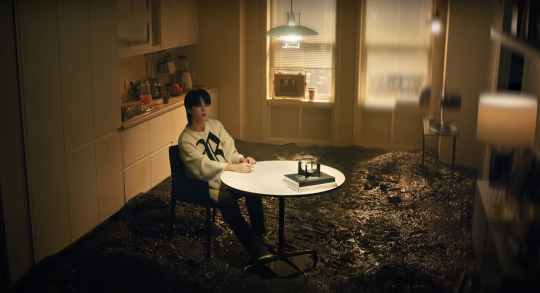
It’s very clear from the beginning of the music video for Like Crazy that Jimin struggles with reconciling a comfort in loneliness with a need to experience intimacy. Regardless of his efforts, the rot of loneliness is never far, seeps in through the walls and stains his hands. As (ironically) relatable of an experience as loneliness is, it does not occur in a vacuum. Rather, the unique experience of queer loneliness and rejection is one riddled by othering from acceptable sexuality and gender experiences and an inability to be framed within normative categories. Robert Phillips, scholar in language analysis as it pertains to gay male sexuality, wrote on abjection through a trans studies framework. To him, the process of horror or unease that defines abjection, through which the “other” is separated from and by an “us,” goes beyond “casting out” and becomes more interactive process; the hegemonic is protected by rejecting whatever does not conform, that is ambiguous, that does not fit in box. “The anxiety at the root of this unease with transgender subjectivity can be traced back, in part, to a fear of the ambiguous.” Loneliness, like queerness, acts as a sort of mark of Cain, a characteristic that becomes so impeded in our being that it if first noticeable and then rejectable.

Despite being marked by loneliness, Jimin is the center of attention for the first act of the music video, featuring him crowd surfing and posing delicately for pictures. Yet, despite his yearning, he makes no move for intimacy. The music video implies the possibility that it is the result of this very hypervisibility as a figure of softness and boyishness, inviting parallels to be made here with the foucauldian references and the power play between surveillance and identity in other areas of the album, namely Set Me Free Pt. 2 (a discussion for another post for another time…..).
Hedonism as an escape
“[Like Crazy] expresses the emotions of the moment when you run away from reality to forget your wounds.”
The overlap between loneliness and overt sexuality is why eroticism is so culturally important to queer communities. Like Crazy explores desire and intimacy through what can be called a queer lens, as an escape and as an unsuccessful means to being perceived and acknowledged outside of suffering. The whole poem is absolutely beautiful, but a specific excerpt of gay Asian-American poet Ocean Vuong’s On Earth We’re Briefly Gorgeous comes to mind: “Don’t we touch each other just to prove we are still here? I was still here once.” As Like Crazy, Vuong’s poem discusses intimacy as the antithesis to loneliness. To be intimate is to come out of ones self. The erotic becomes an avenue to salvation (I will permit myself a little shoutout to Christian mythos by drawing parallel to the Song of Songs - we all dream of kissing God, of laying with the presence of something larger than us, and finding deliverance from it!).

Like Crazy communicates a power struggle between desperation for intimacy and an addiction to loneliness. What Jimin says about it and the juxtaposition with the actual visuals of the music video paints the picture of an attempt to build closeness on the foundations of perpetual solitude. In Like Crazy, closeness is futile. Loneliness becomes a lifelong lover, and intimacy an occasional affair. Though still better than perpetual solitude, it is marked by disillusion: “I’d rather be lost in the light.” Rather than evoke the image of a passionate one-night-stand, it acknowledges of the persistence of loneliness. queer latino write John Paul Brammer evokes this feeling:
“Loneliness, I find, continues too. Our relationship with solitude is one of the most important ones we have in this life. No matter how full and vibrant and loud we make things, the quiet always finds us.”
Despite Jimin’s desires for closeness, we don’t actually see him making any move for closeness. Rather, despite his best efforts, he walks against the course of those around him in a repeated shot before knocking the camera’s lens away; again, a parallel to the surveillance of set me free, as well as a possible denial of him pace against the grain.
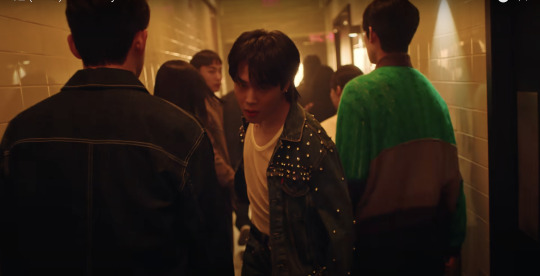
Queer desires and longing
“Let me have a taste / Give me a good ride.”
For non-queer people, what is difficult to understand in the particularities of queer loneliness is its entwining with desire. It’s an unspeakable yearning - as much in the ways it is indescribable as it is often life-threatening to do so. It is a profound sense of non-belonging felt in the knowledge that you are not as others are or see you because of a fundamental issue with how - and for whom - you experience desire. As a result, the erotic and sexuality along the margins of what is normative, i.e. reproductive cisgender heterosexual missionary sex after marriage, are profoundly radical and embodied manifestations of queer desire: kink, bondage, leather, sadomasochism, casual sex, chemsex, etc. all contribute to this expression of queer intimacy and self actualization.
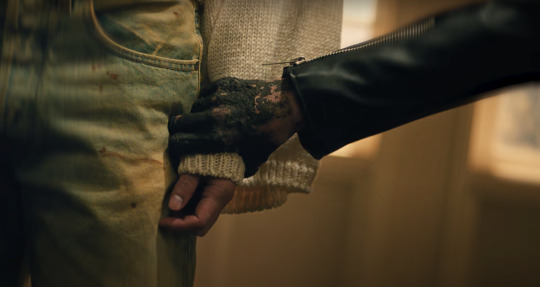
I know I’m being a little dramatic in the set-up here but it is really difficult to try to explain this inherent outcasthood to straight people. It is such a specific experience that is so untranslatable, and yet it is a feeling that I pick up so strongly in the Like Crazy music video. The remedying of sexuality with the profound alienation that queer people feel up until, very often, a dramatic and self-destructive discovery in young-adulthood, is something that straight/cis people just can’t understand. Leading African queer scholar and (erotic) writer Keguro Macharia writes:
“what is the taste of loneliness? / salt-bitter-sweet-nothing / after midnight, in cars, in booths in sex shops, in dark bedrooms, in anonymous hotel rooms, encounter after encounter, trading orgasms for ‘hold me’ and ‘let’s cuddle’ ‘if I suck you off, will you cuddle with me’ ‘if I let you fuck me, will you cuddle with me’.”
I’m not knowledgeable on kink culture so I won’t get too into it but I think it’s really interesting how submissive the lyrics come off. What is striking about the way Like Crazy approaches desire that sets it apart from any generic “we found love in this club”-type pop song is its desperate tone rather than one that boasts virility with promises of a “good time.” Instead, Jimin is the one pleading.
Queer loneliness as liberation
“She’s saying, ‘Baby, don’t think about it / There’s not a bad thing here tonight.”
Like Vuong’s poem, Like Crazy could also become a larger question on a heterosexual culture that is increasingly anxious about bodies and touch. The music video can be clocked as having the intention to discuss the erotic - the Robert Mapplethorpe reference is enough to assert this - yet it does so very tamely. Everyone is clothed, no one touches too much, the atmosphere is fun, chill, controlled. Jimin, despite his expressed desperation for closeness and hedonism as told through the lyrics and through his interaction with those at the party, through the careless throwing back of shots, does not find what he needs. The environment is too controlled, too “straight” (as in “proper,” or “innocuous”). He himself does not find any intimacy. He stays at the center of it all, untouched, and not daring to get closer.
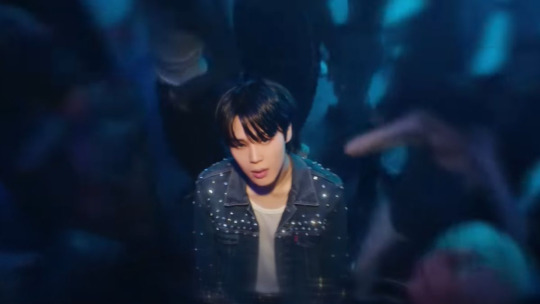
Something that is reflected by a lot of trans theory writers (some whom I’ve read including Paisley Currah and Dean Spade) is that the normalization process in inclusion produces and reproduces ideas on who is and “insider” and who is an “outsider.” I read a bit of Melissa Caroll’s thesis on the political implications of queer loneliness as part of my own (much shorter) thesis. In it she discusses how “straight” culture, through the aforementioned social accounting processes, delimit the realm of the socially accessible, in a process Denise Riley calls loneliness. Caroll says:
“Currently, any public declaration that “I am lonely” presumes that we are registering this feeling based on what we have been led to believe that loneliness, as a term, means: sad, alone, lacking, in need or want of friends, odd, bizarre, queer, and unhappy.”

Heteronormative abjection of queer and trans modes of being are increasingly reclaimed as constructive and disruptive political strategies. As postmodernist feminist scholar Julia Kristeva writes, abjection is “the place where meaning collapses.” Rejection of inclusion to instead embody abjection and loneliness is another cornerstone of queer self-affirmation that is explored, again, through the erotic and the sexually obscene. The tame nature of the music video, Jimin’s desperation, implies a dissociation from himself and a refusal to face himself. There is an acknowledgement of the futility of his desires for closeness beyond what he is “marked” for, that it will “break” him yet he refuses to be “saved.”
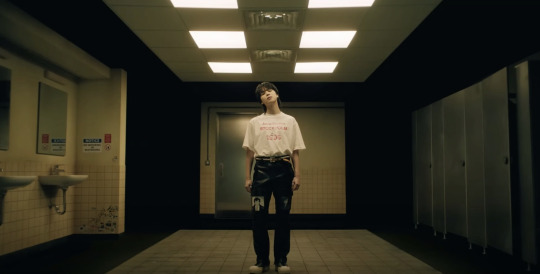
So, regardless of whether Like Crazy truly is an attempt to explore the unique nuances of queer loneliness, it is clear that what it does discuss is struggle against self. The music video depicts not romantic rejection or conflict, but rather an imposed alienation. A self-rejection from an objected self and from a normative way of life. The stained, leather clad hand presumably belonging to Jimin himself dragging him to the party, the knocking away of the camera as a refusal to accept a self or to showcase that “wound,” the interplay between the warm shots of androgyny and desire contrasted with the cool setting of the club. The premise of the music video and its use of a movie itself is a refraction of this longing and abjection in a way; what does it say to attempt to translate a profound feeling of disorientation and loneliness within a normative context through the reference of a romance film featuring a White, conventionally attractive, heterosexual, cisgender, normative couple as a man of colour often read as gender non-conforming?
TLDR: Whether Like Crazy or FACE globally means to discuss queer loneliness and desire, the way they are ultimately explored and the play on gender and belonging imply a framework that is, intentionally or not, queer.
#this is excessive i know. im sleepy n i need to shower ill prbably come back together and chop it down to half wtv#im not joking when i say its long. be warned.#essayposting#🏹
139 notes
·
View notes
Text
The Dark Secret of Kung Fu Panda (Part 1)...
... Shifu is kind of a shitty teacher.
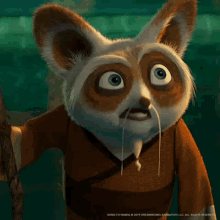
But only if you live in the West!
Apparently, you all like Panda analysis, so let's talk about cross-cultural translations, Theravada Buddhism, filial piety, and the ultimate futility of writers trying to impart a specific interpretation to a diverse audience - just to start! Then, I'll come back on Thursday and we can unpack WTF is the deal with that Dragon Scroll.
American movies can pick up a lot of box office cash in China, so they try like hell to stay inoffensive and relevant to Eastern and Western audiences. Often, they fail spectacularly.
But Kung Fu Panda pulled it off! ...With just a little wobble on the dismount.
Chinese audiences have little to complain about when it comes to these guys:

But here in the West, we can't seem to stop coming up with reasons all three of 'em got a raw deal - even the ones who were a little bit genocide-y.
And especially this li'l guy.
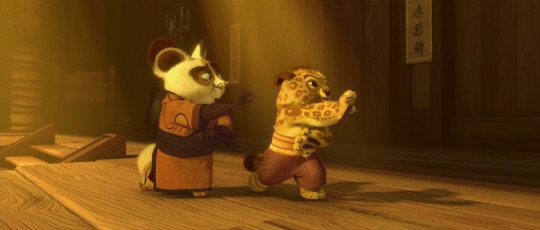
Aw, no, look how cute!
People will bend over backwards to defend that cute kid (and sexy adult), to the point of throwing Oogway, Shifu, Po, Tigress, or the whole franchise under a bus.

There are folks out there who are gonna die mad about Tai Lung's lack of a redemption arc and humiliating demise. Like, literally.
To their credit, the Kung Fu Panda team caught this after some early screenings and tried to fix it. Tai Lung's betrayal and attempt to steal the scroll just wasn't enough, so they added a massacre, and every villain after Tai Lung had an impressive kill count woven into their backstory right from the start.

(Not that it necessarily helped, if you happen to look this bad boy up on DeviantArt.)
In a wuxia film, and in Chinese culture in general, betraying your father/teacher, and asking that they betray their father/teacher is more than enough to make a villain. Given that filial piety is the basis of all ethics, as taught by Confucius himself, what went down in the Jade Palace was an attempt to burn society itself to the ground, all because one guy felt entitled to a shiny piece of paper. That is Captain Planet levels of self-destructive evil.
All three movie villains pulled off some violation of this fundamental ethical duty. Tai Lung betrayed his father/teacher. Lord Shen betrayed his parents - and managed to let his teacher go, with sadness and disappointment on both sides. Kai betrayed his adoptive brother - although from his point of view, his brother betrayed him, so he may be the most sympathetic of them through this lens.
The only way to impart this level of wrong across cultures is to add a lot of murdering, and even then it doesn't quite scan. Tai Lung didn't even necessarily kill anyone in the village; cartoons get nervous about the word "die" around these here parts, so they just said he "laid waste." Well, that could mean a lot of things! Does that guy deserve decades of solitary in a hell-prison for (in my mind) doing nothing more than calling out an unfair action and leaving a bad Yelp review of Mr. Ping's noodles?

I can't trust a bird who eats noodles, I don't care how cute his hat is!
So, it's not just that the violation of ethics doesn't carry, the concept of "unfair" crept into a place where it really doesn't belong. Traditionally, it is perfectly acceptable for a Kung Fu Master to be a total piece of shit who motivates his students to learn out of sheer spite and puts them through hell.
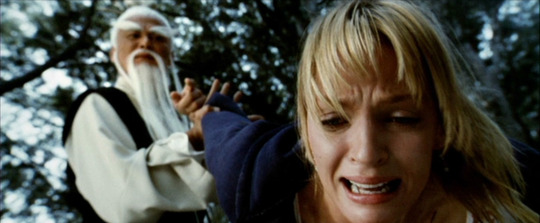
Oh, yeah, I remember him. That moustache looks familiar...
If we're coming from a place where we buy that trope and expect it to be played straight, Shifu's mistake was being too nice to Tai Lung. His student's self-esteem was insufficiently crushed! That boy had the nerve to break his own Master's leg! Thank goodness Shifu became a cold, uncaring, emotionally-distant task master - just in time to raise Tigress right!

Yes. Good. Never let on that you're pleased with anything your student does. That'll keep 'em in line!
But a Western audience isn't going to buy that. Shifu just looks like a jerk, and Tigress is a jerk... In fact, all of the Five, save Viper (who is just that nice) seem like jerks, and Oogway is a troll.

"Oh, I'm sorry, did you have something urgent to do? I think blowing out these candles, one-by-one, is rather important too."
Being an utter troll is also a valid way to teach kung fu, and Buddhist practices in general, which is definitely where Oogway is coming from. I peg him as a Theravada Buddhist, due to the way he teaches, and one scene in particular from the third movie.
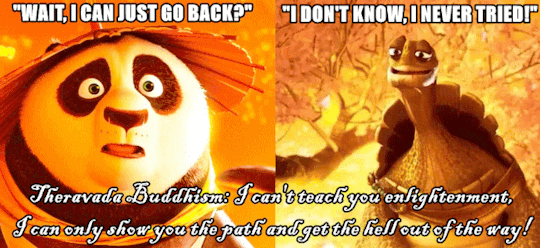
Enlightenment isn't something you just hand over like a piece of paper, it's something everyone has to find for themself, in their own way. It's not possible to teach Tai Lung or Po self worth, and it's not possible to teach Shifu to lighten up, so the best a smart teacher can do is give them a good nudge, then step back and see what happens.
...Even if that "nudge" requires one to ascend to the Spirit Realm and leave your most stubborn student to clean up his own damn mess.
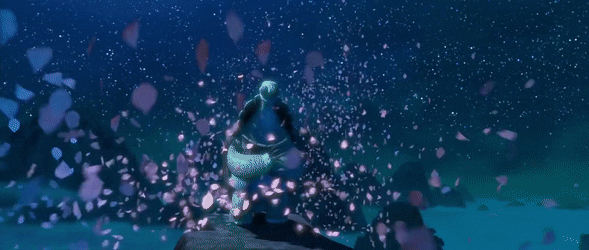
But there aren't as many Buddhists watching in the West, so what's a writer to do?
Well, they split the difference. Tigress did grow up better than Tai Lung, in accordance with the tropes, but it turns out she's not done learning and growing, and neither is Shifu (or the rest of the Five, but they don't get much of an arc. There are time constraints!). Their arrogance and lack of flexibility render them incapable of working with someone like Po - and they gotta figure out what they're doing wrong fast, 'cos Shifu's other teaching mistake is on his way back! In China, Shifu is learning to be a better teacher. In the West, he's learning to stop being a shitty teacher! And it takes him all three movies to grasp the humility he needs to learn from Po. Tigress, on the other hand, learns to respect Po and soft style by the end of film one.
When Western values are applied, Shifu comes off as a very slow learner, due to his own impatience and inability to slow down. But that's okay. He does learn, he's clearly trying, and we love him anyway.
Well, most of us do. Some of us can't get over that cute, fluffy little leopard, and we don't buy the (admittedly imperfect) attempt to make this story intelligible across cultures. These folks tend to focus their ire, much like Tai Lung himself, on that useless piece of paper the troll stuffed in a temple like it was something important, and the jerk led Tai Lung to believe was rightfully his. Why can't the boy just have his useless piece of paper, huh?
Well, I'll come back later and I'll tell ya.
#kung fu panda#po#shifu#oogway#tai lung#buddhism#cross cultural translation#stories#confucianism#villains
99 notes
·
View notes
Text
Another way to appreciate Hell Bent is if you consider its structure and compare it against Heaven Sent. As much as Heaven Sent occurs in media res, it is very much an “ordered” story that regardless occurs at the beginning, just not the correct temporal one. There is a clear linear trajectory in what the Doctor does and what he experiences, with only the “difference” (consider the usage here loosely) from other episodes being that he is entrapped in a constant cycle of the narrative hero versus monster-of-the-week being different from a lot of episodes.
In comparison, the moment he breaks through the Azbantium wall, he stumbles upon the mythic, previously inaccessible Gallifrey. Where Heaven Sent is orderly in structure, upon giving up his heroic ideal to rescue Clara, he acts as a destructive force that causes the mythic place of Gallifrey to collapse upon itself. This results in what should be a “stable” narrative set in Gallifrey for a mythic hero to give way into a series of symbols, subtexts and themes. This is most evidenced by the Gallifreyean conflict mirroring that of a Western, which is subverted. The Doctor is shown to completely give up his mantle and act as an Eastwoodian, man with little words gunslinger archetype (it is incredibly ironic and interesting that Rassilon states that, “words are his weapons” when the coup occurs with barely a word stated). The positioning of the Doctor as an archetype such as this is vital because it unveils a certain dual perception. The archetype suggests a certain connotation of the heroic for the audience while its intrinsic ties to the masculine, violent gunslinger also in hindsight frames the Doctor as clearly in violation of any moral code (it is also interesting if you compare this to The Doctor Falls which likewise utilises the Western genre to illustrate a contrastive point)
This “collapse of narrative” upon stumbling into Gallifrey is also most notable during the scene when Clara is extracted from her timestream. From the lens that I am taking, it is incredibly fascinating to hear what seems to be something breaking (the sound design is really interesting to observe when taking this lens) followed by Clara and The Doctor rendered with a stereoscopic effect (think about the fact that there is a clear disruption of the process of the medium of television itself) and THEN they proceed to enter a blank white room and away from the prior narrative space. I bring attention to this because if Heaven Sent occurs as a series of repetitions that perpetuates the same heroic ideal, Hell Bent shatters the heroic narrative setting of Clara’s demise and she’s essentially dragged to an observer space, or a space behind the scenes.
To even further elaborate on this, think about the cloisters, a labyrinthine graveyard of Doctor Who lore that is doomed to persist. Time Lords get lost in the hell which is the Cloisters because it is a narrative hell. The messy, overgrown basement that is covered over by the face of a linear mythos. Think about the backstory of the Doctor or even better, if you’ve listened to Zagreus, if you’ve read any comic, there isn’t a clear linear canon of the lore that we expect there to be. The cloisters represents that question of how we navigate the mythology of Doctor Who itself. Gallifrey then isn’t just a backdrop to the relationship of Clara-12 but the way in which Moffat subverts what we expect of Gallifrey though the visual imagery and metatextual subtext also reveals to us that Gallifrey is not at the foreground because The Doctor by denouncing his mythic status, directly attacks the foundation of the mythology he was built from.
This also functions as the reason of why Clara can ascend and in my analysis, I state that she sails off not just into a narrative ambiguity but into a narrative infinite. The Doctor is not just destructive in the aforementioned ways, but he’s also destructive in how he seeks to (by retconning Clara’s demise), enforce a new narrative order with a degree of masculinity due to the aforementioned ties to the gunslinger figure. Clara (as protege) as the successor of The Doctor is also that of a refusal to be bound to a masculine narrative order and also the inevitability to contribute to merely the lore surrounding the mythology of The Doctor.
Robin in The Robots Of Sherwood stated:
“History is a burden. Stories can make us fly.”
Clara is no longer historical (refer to the General’s speech) bound to the burden of The Doctor’s history (history as an accumulation of narratives based in reality). She has become a story by breaking out of the confines of the screen (refer back to the extraction scene’s visual language). In conjunction with her splinters and her separation from her codependency, she is free to carve out a mythology separate from that of the show. Thus, she DOES sail into a dual infinite/ambiguity; in order to transcend, she cannot be observed but only imagined.
Heaven Sent/Hell Bent are powerful pieces of media not just because they are stories about love or grief but also how their subversion of narrative is incredibly layered. I think the power emerges from the multiplicity of interpretation the viewer can derive from both pieces. I think both are equally challenging works that deserve the hype. If you want to explore more of this, I’d HIGHLY recommend Gigawho’s brilliant essays revolving around Hell Bent: Bent Sent and Everything You Know Is Lore. They are both some of the best essays I’ve ever read with respect to both Doctor Who and literary criticism! In fact, I was originally planning on writing something longer with references to both essays.
(Note: You can also observe the subjective presentation of Heaven Sent or how Hell Bent demystifies Gallifrey by removing the mythic from it setting wise by illustrating a more “real” political backdrop and conflict in comparison to the more “othered” setting of Heaven Sent. It is also worth looking at the conversations of Clara And The Doctor in Hell Bent’s diner in context of an encoded narrative)
16 notes
·
View notes